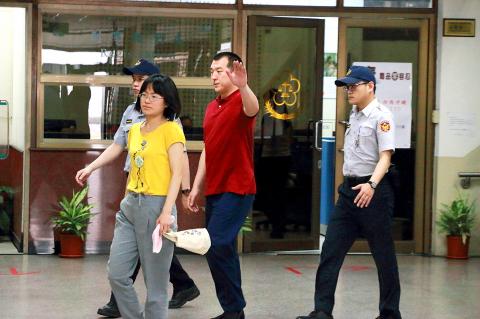The Taiwan High Court yesterday released convicted Chinese spy Zhou Hongxu (周泓旭) after his legal team appealed for him to be freed, but barred him from leaving the country and ordered him to report daily to the police.
The Taipei District Court on Sept. 15 last year convicted Zhou of espionage and breaching the National Security Act (國家安全法) and sentenced him to 14 months, a ruling that was criticized by many people as too lenient.
The High Court yesterday agreed with Zhou’s lawyers, who argued that he had effectively served his sentence since he had been held in detention since Taipei prosecutors took him into custody on March 9 last year for questioning into allegations he had been recruiting people to spy for China.

Photo: CNA
The court cited Code of Criminal Procedure (刑事訴訟法) provisions for its ruling, but it imposed travel restrictions and limits on public statements, and required him to report daily to the Liuzhangli Police Station, the nearest station to his Taipei residence.
As Zhou walked out of the court yesterday, he told reporters: “I will appeal my case, because I am innocent of the charges.”
Zhou said he needed to be careful with his words, because he needed to obey the restrictions the court had imposed on his public statements about his case.
The 31-year-old Zhou first came to Taiwan in 2009 to study at Tamkang University in New Taipei City’s Tamsui District (淡水) and later returned to study for a graduate degree in management at Chengchi University from 2012 to 2016.
In a related development, New Party spokesman Wang Ping-chung (王炳忠) has been listed as a defendant in Zhou’s espionage case.
Prosecutors suspect that Zhou recruited Wang to help him develop a spy network as a means of penetrating important government ministries and to source classified materials to pass on to Chinese authorities.
In their ongoing investigation into separate charges in the case, Taipei prosecutors last week summoned Wang and several of his associates for questioning, including New Party youth wing executives Ho Han-ting (侯漢廷) and Lin Ming-cheng (林明正), and a party accountant surnamed Tseng (曾).
Wang failed to appear last week, but presented himself on Monday, when he was listed as a defendant on charges of violating the National Security Act.
Ho, Lin, Tseng and Wang’s father, Wang Chin-pu (王進步), did appear for questioning and were later released, but with travel restrictions.
Wang Ping-chung is known for his pro-China views and has made frequent trips to China, often appearing as a political commentator on Chinese state media.

Chinese Nationalist Party (KMT) Chairman Eric Chu (朱立倫), spokeswoman Yang Chih-yu (楊智伃) and Legislator Hsieh Lung-chieh (謝龍介) would be summoned by police for questioning for leading an illegal assembly on Thursday evening last week, Minister of the Interior Liu Shyh-fang (劉世芳) said today. The three KMT officials led an assembly outside the Taipei City Prosecutors’ Office, a restricted area where public assembly is not allowed, protesting the questioning of several KMT staff and searches of KMT headquarters and offices in a recall petition forgery case. Chu, Yang and Hsieh are all suspected of contravening the Assembly and Parade Act (集會遊行法) by holding

PRAISE: Japanese visitor Takashi Kubota said the Taiwanese temple architecture images showcased in the AI Art Gallery were the most impressive displays he saw Taiwan does not have an official pavilion at the World Expo in Osaka, Japan, because of its diplomatic predicament, but the government-backed Tech World pavilion is drawing interest with its unique recreations of works by Taiwanese artists. The pavilion features an artificial intelligence (AI)-based art gallery showcasing works of famous Taiwanese artists from the Japanese colonial period using innovative technologies. Among its main simulated displays are Eastern gouache paintings by Chen Chin (陳進), Lin Yu-shan (林玉山) and Kuo Hsueh-hu (郭雪湖), who were the three young Taiwanese painters selected for the East Asian Painting exhibition in 1927. Gouache is a water-based

Taiwan would welcome the return of Honduras as a diplomatic ally if its next president decides to make such a move, Minister of Foreign Affairs Lin Chia-lung (林佳龍) said yesterday. “Of course, we would welcome Honduras if they want to restore diplomatic ties with Taiwan after their elections,” Lin said at a meeting of the legislature’s Foreign Affairs and National Defense Committee, when asked to comment on statements made by two of the three Honduran presidential candidates during the presidential campaign in the Central American country. Taiwan is paying close attention to the region as a whole in the wake of a

OFF-TARGET: More than 30,000 participants were expected to take part in the Games next month, but only 6,550 foreign and 19,400 Taiwanese athletes have registered Taipei city councilors yesterday blasted the organizers of next month’s World Masters Games over sudden timetable and venue changes, which they said have caused thousands of participants to back out of the international sporting event, among other organizational issues. They also cited visa delays and political interference by China as reasons many foreign athletes are requesting refunds for the event, to be held from May 17 to 30. Jointly organized by the Taipei and New Taipei City governments, the games have been rocked by numerous controversies since preparations began in 2020. Taipei City Councilor Lin Yen-feng (林延鳳) said yesterday that new measures by